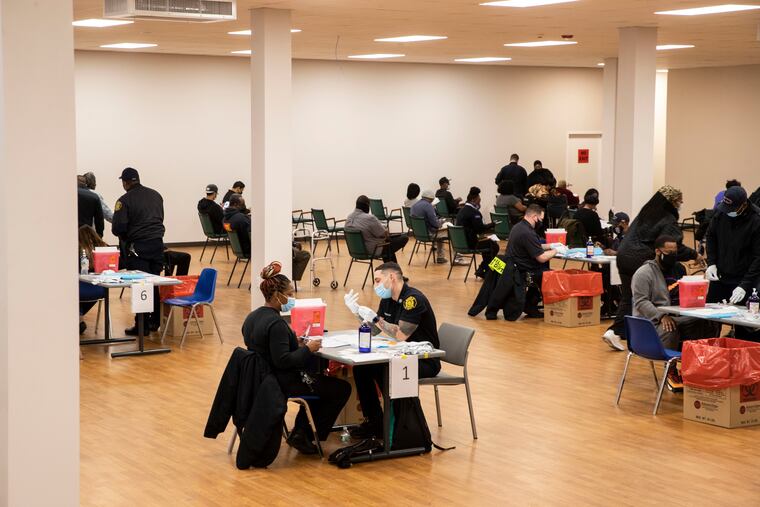All Philly adults are now eligible for COVID-19 vaccines
The city had been planning to expand eligibility to all adults on Monday, but moved up the timeline when providers reported that not all of their appointments were filling up.

Philadelphia will immediately expand vaccine eligibility to all adults, Health Commissioner Thomas Farley announced Friday.
The city had been planning to expand eligibility to all adults on Monday, but Farley said that a number of vaccine providers reported this week that not all of their appointments were filling up.
”We don’t want those vaccination slots to go unused,” Farley said.
The availability of appointments means that the city is entering a new phase of the vaccination process, Farley said.
”It’s clear to us now that our task is different,” he said. “Our task is encouraging people who are unsure to come in and get vaccinated.”
Farley said about 40% of the city’s adult population has gotten at least one dose of the vaccine. Experts say about 70% is necessary for herd immunity against the coronavirus.
”We’ll find out,” Farley said on whether it will be difficult to achieve that level of vaccination. He said he is encouraged by polls about Americans’ willingness to be vaccinated, and the city will work to make it easy for people to get shots.
At the Convention Center vaccine site, which can administer about 6,000 shots per day, Farley said only about 4,000 people were vaccinated Wednesday and 4,600 people were vaccinated Thursday. And at the federal-run clinic at Esperanza in North Philadelphia, which can handle at least 1,000 doses per day, Farley said only about 200 people received shots on Thursday.
Farley said he hoped that some of that decrease could be attributed to confusion over the Johnson & Johnson vaccine; both of those sites had to switch to giving Pfizer shots when Johnson & Johnson distribution was paused this week. But he said the city will focus on improving and expanding outreach, especially in North Philadelphia.
Even as eligibility expands, Farley said he is still concerned that not enough residents age 65 and older are vaccinated. He said city-run clinics will continue prioritizing seniors. About 54% of residents age 75 and older have had at least one dose, along with 44% of residents between the ages of 65 and 74, according to city data.
The expansion came as the rate of new cases of COVID-19 continues to increase in Philadelphia, and Farley said he is also worried about an increasing number of deaths.
“I’m worried that people believe that the problem is behind us, and it’s not behind us,” Farley said.
The city currently has an average of more than 600 new confirmed cases per day, Farley said. As of Friday, there were 513 coronavirus patients in Philadelphia hospitals, with 53 of them on ventilators.
Farley said that the number of COVID-19 deaths per week had hit a low of around 20, and “is now getting closer to 40.”
The city announced 16 additional deaths Friday. A total of 3,375 residents have now died of the coronavirus.
In other coronavirus news Friday:
Pennsylvania officials said it was too early to gauge the impact of the Johnson & Johnson vaccine pause, and initiatives to inoculate corrections officers and incarcerated people, some Department of Human Services Facilities, and some food and agriculture workers with the one-shot vaccine. The Center for Disease Control and Prevention’s Advisory Committee on Immunization Practices will meet on April 23 to consider whether the shot should be continued, discontinued, or recommended only for certain groups of the population. “Once we learn more next Friday, we’ll pivot accordingly,” Acting Health Secretary Alison Beam said, “but we’re already working on our contingency plans to make sure we’re ready to do that.”
Gov. Tom Wolf said he will get his first COVID-19 shot on Monday, and urged all residents to make appointments.
The Pennsylvania Department of Health has reported 331 people have tested positive for coronavirus after finishing their COVID-19 vaccination course, just 0.013% of the fully vaccinated population of more than 2.5 million people. “Breakthrough cases are normal with any vaccine. We know that the more people are vaccinated, and the fewer chances for exposure and infection there are, the less likely we are to see breakthrough cases,” said Maggi Barton, deputy press secretary for the health department. Breakthrough cases are defined as new infections at least two weeks after someone has finished their full vaccination course. Experts have said these types of cases are expected, as none of the vaccines offer 100% protection against the virus.
Staff writers Rob Tornoe and Justine McDaniel contributed to this article.